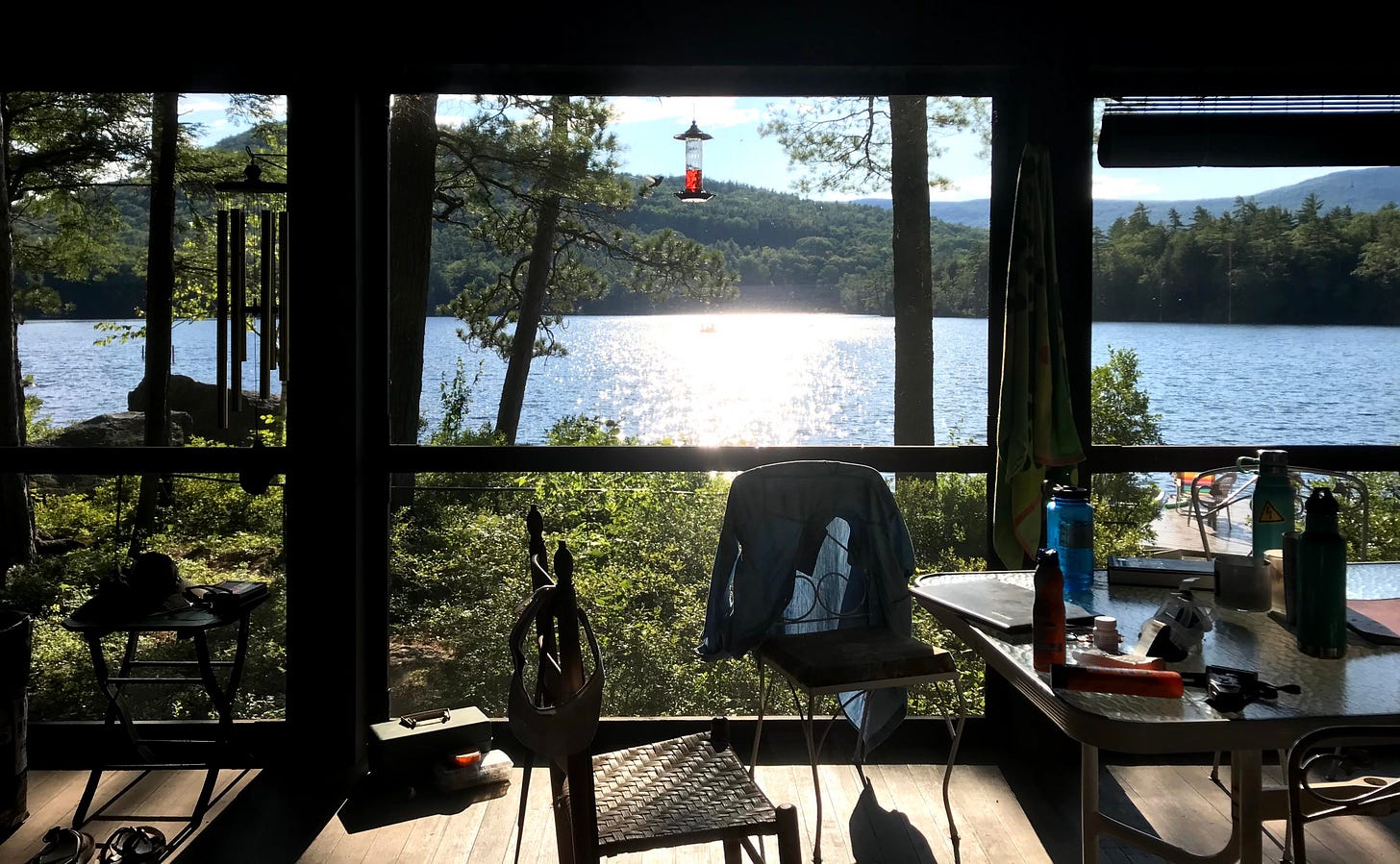De-influencing "monetizing your passion"
to perform a labor of love, you must feel love for that labor.
Finding a way to make money off the things you love to do most? All the rage these days.
As someone who quit their stable job to launch a freelance writing career almost six years ago, I’m no stranger to the fantasy of waking up every day to make money doing something you love.
There are usually two ways to do this:
You find a way to parlay your creative passion into a more marketable, mainstream, in-demand skill. See: the poet who becomes a Facebook Ads copywriter, the artist who turns into a web designer, the folk singer who starts writing jingles for the radio.
You find a way to directly make money off the things you love to do. See: the writer who sells personal essays to media outlets, the painter who makes murals for local businesses, the indie band that books regional venues.
Regardless of which path you take, there are ways in which you might find yourself living the dream but realizing the fantasy doesn’t actually exist. After the last six years of paying my bills, traveling the world, and working full-time “doing what I love,” here are all the ways in which I’d like to de-influence the fantasy of Monetizing Your Passion™:
1. Making your passion your job burns you out on the stuff that once fueled you.
Let’s say, like me, you decide to Monetize Your Passion™ the first way I just described: you find that marketable skill and you build a career out of it.
At first, there is nothing more thrilling than making money flexing your creative skills.
I earned my first few thousand writing dollars pumping out keyword-stuffed articles for content mills and writing for a hemp underwear brand’s blog. For a while, there was nothing cooler than typing up my little articles at the coffee shop, invoicing a few hundred bucks, and seeing my name in the byline—even if it was for an article titled 11 Reasons You Should Not Try Freeballing. (This is real but I can’t bring myself to link it—google if you must).
The more experience I got under my belt, the easier it became to book more clients. However, while I was making all my money “doing the thing I loved,” I didn’t actually love any of the work I was doing. I’ve talked about this plenty—you can read about why I quit my successful freelance writing career, and why it’s taken me so long to do it.
If you become the second type of person who Monetizes Their Passion™, you’re going to rely on your creative passion to pay the bills.
Which begs the question: what happens to your income when you burn out?
What so many people call “artist’s block” is actually just a valid, necessary, unskippable part of the creative process. Sometimes, the field must lie fallow in wait. You must rest. You must percolate. You must ponder. You must create the void space that creativity flourishes in.
But if rent is due on the first of the month, you can’t always let your creative process be what it needs to be. Because, shit—turns out a fallow field can’t pay the bills.
2. Monetizing Your Passion™ can put untenable financial pressure on your creativity.
This leads me directly to my next point—if your creative spirit starts to feel the weight of all your financial burdens piling up, you can’t be surprised when she shrivels up in fear and hides out in the corner of your psyche.
Creativity demands play and experimentation. You must be willing (and able!) to make some oopsies. It’s hard to have the necessary fuck-it energy your creativity demands when you must churn out more work in order to keep the lights on.
Even as someone who parlayed my passion into a more marketable creative job, I still felt the pressure to perform. My clients expected a certain level of creative guts: they were paying good money for it, and I had to turn it on whether I wanted to or not.
This often felt like a form of creative self abandonment. While I’m a big believer that creativity is a habit and we can’t sit around waiting for the muse to strike, I also know that we can’t force what isn’t right or ready. But sometimes, you must if you want to buy groceries for the week.
3. You’re going to wind up playing every role—even the ones you hate.
While this is only true for folks who run their own business, it needs to be said, because when we talk about Monetizing Your Passion™ we’re usually talking about people who work for themselves “doing what they love.”
Nothing has made me more exhausted or more resentful of my creative work than having to also be the accountant, the project manager, the receptionist—everything. Being a one-woman show feels pretty kickass, but in the day-to-day it actually sucks ass.
When someone doesn’t pay their invoice, I’m the one who has to chase them down and eventually threaten taking them to small claims court.
When there are eight billion emails in my inbox, I’m the one who has to answer them all in a timely fashion.
And when professional relationships sour (which thankfully for me has rarely happened, because I’m a goddamn peach), I’m the one who has to salvage the project or risk losing out on expected income.
That being said, I’ve never lived a more sparkly, self-motivated, dream life than when I decided to monetize my passion.
Ultimately, I don’t want to discourage you from following your dream of trying to live a more creative life and make good money doing it.
As much as the past six years have challenged me, I wouldn’t change them even if I could.
Turning my creative passion into the way I pay my bills has taught me to be a more creative problem solver, given me the skills to run my own business with confidence, and opened up whole new worlds of personal and professional connections.
You can only learn if monetizing your passion is right for you if you try it.
These days, my dream is to move from the first type to the second type, even though my eyes are wide open to all the new challenges I’ll face when my creative projects become both more aligned with my personal visions and responsible for paying my rent.
Here’s to trying!
Honey’s Toolbox is here to help you refill your creative cup and put your ideas into action—from prompts to spark your imagination to gentle nudges that get you moving. Grab a few tools my friend, it’s time to start tinkering alongside your creative spirit.
1. Read ’s deep dive on monetizing your passion
I loved reading Amie’s take on selling your art, in which she argues both sides, saying:
“Not selling your art is revolutionary, holy and important.”
and—
“Selling your art is revolutionary, doable and HOLY.”
2. Recreate a favorite childhood art project
If you want to make something just for your own sense of joy, might I recommend plumbing the depths of your early art class memories for creative inspiration?
Making art should be fun, and there was nothing more delightful than the art projects we made when we were five.
Think: potato stamps, soap carving, cootie catchers—hell, you could get one of those mosaic kits from the craft store and decorate a beautiful imprint of your pet’s paws.
3. Read A Ghost in the Throat by Doireann Ní Ghríofa
This book is chilling inspiration for falling down your own research rabbit holes and fixations, and discovering all the ways in which your favorite art can inform your own creations.
From the book jacket:
“On discovering her murdered husband’s body, an eighteenth-century Irish noblewoman drinks handfuls of his blood and composes an extraordinary lament. Eibhlín Dubh Ní Chonaill’s poem travels through the centuries, finding its way to a new mother who has narrowly avoided her own fatal tragedy.
When she realizes that the literature dedicated to the poem reduces Eibhlín Dubh’s life to flimsy sketches, she wants more… What follows is an adventure in which Doireann Ní Ghríofa sets out to discover Eibhlín Dubh’s erased life—and in doing so, discovers her own.”
4. Don’t miss the last planetary alignment until 2040
All this month, six planets are visible in the sky just after sunset. At the end of February, Mercury will join the line, marking the seventh planet in the parade. This astronomical event won’t repeat itself again until 2040.
No telescope? No problem—five of the planets are visible to the naked eye: Mercury, Jupiter, Venus, Saturn, and Mars.
That’s all for now.
Talk soon,
Katie









Isn’t it funny how throughly we have been conditioned to think of passion as only valid if it generates income?